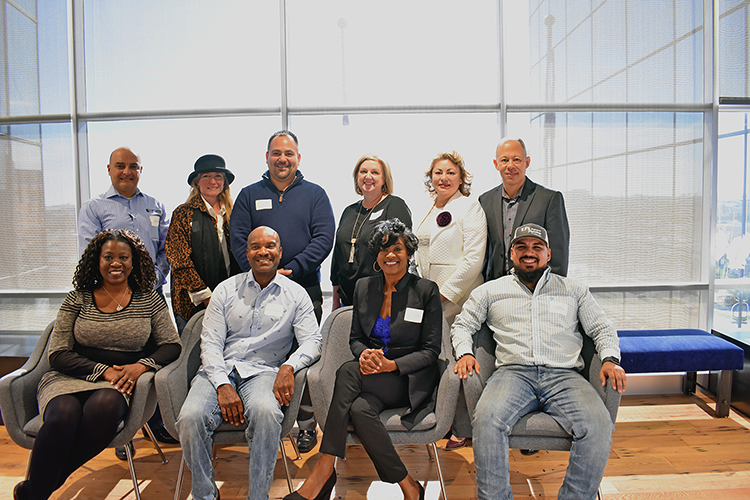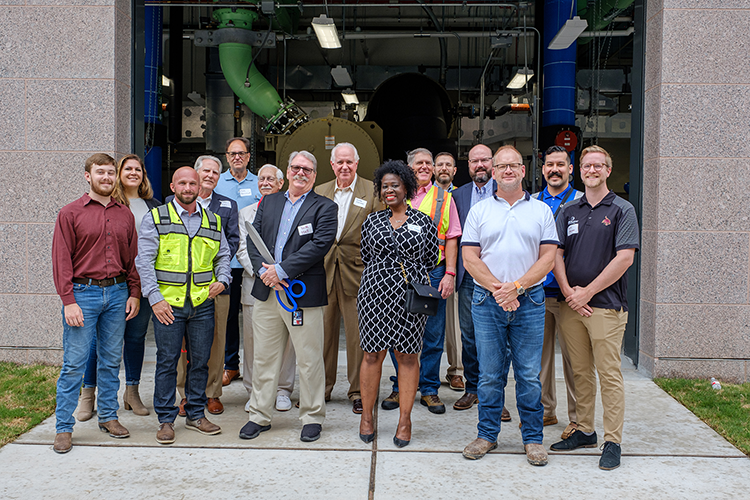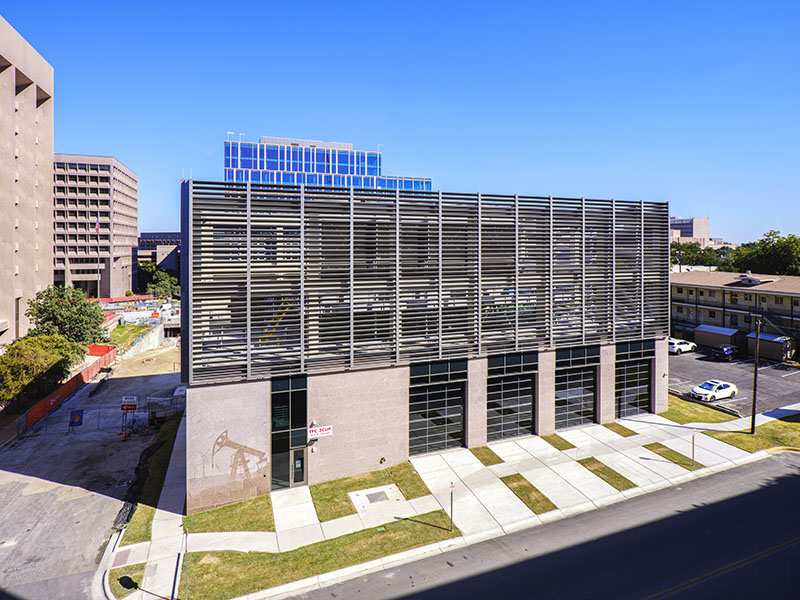 By: Indria Hollingsworth, Diversity, Equity, and Inclusion (DEI) Manager, JE Dunn
By: Indria Hollingsworth, Diversity, Equity, and Inclusion (DEI) Manager, JE Dunn
Indria Hollingsworth is the Senior Diversity, Equity and Inclusion Manager for JE Dunn Construction, overseeing DEI efforts for the Texas and Oklahoma offices. Indria lives and works in Dallas.
When I think about the partnerships that JE Dunn Construction is fostering with our trade partners, I am reminded that the company had its start as an electric company in Kansas City, Missouri. Our founder, John Ernest Dunn, was adamant about building relationships and treating everyone, especially our trade partners fairly. It’s a key value we carry today.
We know trade partners are the backbone of the construction industry. They are the experts of their trades, crucial to building skilled construction professionals, and a key part of bridging the growing workforce gap. We have a duty to build substantial partnerships and procurement opportunities with our trade partners so they can continue to grow their capacity and experience.
Innovation and ingenuity come from the diversity of ideas, experiences, and perspectives, and this is what these firms bring to push us all forward into the next generation of construction.
In 2018, I joined JE Dunn as the Diversity, Equity, and Inclusion (DEI) Manager for our Texas and Oklahoma offices. JE Dunn was committed to partnering with and developing small, diverse, women/minority-owned, disadvantaged firms. The company implemented a Minority Contractor Development (MCD) program in 2006, which helped achieve participation goals on projects and drove engagement in local outreach initiatives.

JE Dunn Construction’s Minority Contractor Development (MCD) program trains small, diverse, minority, and women-owned contractors on business and leadership skills to complete in the construction industry. Smaller classes provide better one-on-one engagement and focus on the individual participant, such as this 2018 Dallas class.
But I knew if we were going to truly change how the region worked with these firms, DEI needed to influence the early decisions made at the operational level. That meant building relationships and having frank conversations about marketplace and workforce diversity with project executives, preconstruction directors, office leaders, and our regional president, Greg Lorei.
Our leadership has been incredibly receptive to this effort. I credit Greg Lorei, our Regional President, for advocating DEI’s role in shaping our trade partner procurement on every project and not just projects with built-in programmatic goals.
Over the years, this shift in mindset has resulted in initiatives with long-term impact and commitment. First, leadership buy-in has organically created champions in every office that are thinking about how we can better develop bid packages and scopes of work for these firms.
We are participating in a State of Texas Mentor-Protégé program with GCC Enterprises, a Dallas-based, African-American owned construction firm that has partnered with us on numerous Dallas projects and will be working with JE Dunn on the second phase of the TFC Capitol Complex project in Austin. Although this is our first protégé program, we want to expand it throughout the region and company.

JE Dunn was the CMAR for three of the six work packages in the first phase of the Texas Facilities Commission Capitol Complex Master Plan, overseeing excavation, utility relocation and the central utility plant for the project that expanded 12 city blocks. HUB participation was a requirement for each package and were exceeded by the project team.
“The Texas Facilities Commission (TFC) is committed to creating a transparent, diverse, and inclusive environment for our employees, business, and trade partners. One way to accomplish this is the Mentor-Protégé program and other similar educational programs that help business owners learn from the experience of others,” said Yolanda Strey, TFC HUB Director, “When successful companies like JE Dunn take time to share their knowledge with newer business owners, they help create a stronger business ecosystem of trade partners, and a stronger economy of all.”

“When successful companies like JE Dunn take time to share their knowledge with newer business owners, they help create a stronger business ecosystem of trade partners, and a stronger economy of all,” said the TFC HUB Director on JE Dunn’s participation commitment.
Mentoring is part of the culture of JE Dunn, and it extends to trade partners. Our Austin leader, Chris Szeliga, and Dallas leader, Chris Peck, have independently mentored owners of small, diverse, women/minority-owned, disadvantaged firms.
“The JE Dunn team opens their doors and gives you 100% energy, focus, and attention. This is not a charity project for anyone [there]. They are pouring valuable time and resources into you so you can become a trade partner and be brought to the table on all projects,” said Stefan Gresham, Jr., CEO of Opifex, an equipment rental company based in Austin. “I hope to always help … and reach back to the local communities.”
Opifex positioned themselves to take advantage of everything offered in JE Dunn’s MCD program. Since their participation in 2020, Stefan and the company have increased their client base and scope of work throughout the state and established philanthropic and industry-based partnerships, making good on their commitment to be part of building a robust construction industry in Texas.
In Austin, we are partnering with the City’s Small and Minority Business Resources department to host “How to Get Certified” events at our offices with access to our teams. In Dallas, we have mentored small and emerging minority and women owned businesses in local (TEXO), state (Texas Facilities Commission), and federal (SBA 8a) mentoring programs.
In 2018, we reformatted the eight-month MCD program and limited the number of participants to offer better one-on-one attention to firms in the program. Since then, in the South-Central Region almost eighty percent of MCD participants have been successful in working with JE Dunn directly or as a second-tier trade partner. Houston was our most recent office that completed the MCD program and graduated 10 companies.
Our Oklahoma office will embark on their MCD program later in 2022 with the goal of onboarding selected firms to the upcoming historic Evans-Fintube project in Tulsa. As we become more rooted in Oklahoma, we’re seeing more clients putting attention and commitment to DEI, which aligns with the growth happening in the construction market and demand for skilled professionals in the field.
Supplier diversity capacity was the topic of interest at a recent Greater Oklahoma City Chamber program and where I spoke about DEI initiatives regarding the AEC industry.
We are listening to what these firms want and what they want is to be recognized as a wholistic partner that has an equal opportunity on public and private projects – large and small, complex, and extra complex so they can be a meaningful part of the future of construction. One hundred percent inclusion, one hundred percent of the time.
This is the work we are doing in Texas and Oklahoma, but it’s not just JE Dunn’s duty. This is work that needs to be done throughout the industry.
We must do our part to bring talent to the industry and help cultivate smart, enthusiastic, skilled professionals both in our internal workforce but also in the external workplace. Small, diverse, women/minority-owned, disadvantaged firms are part of that talent. We must simply meet them where they are today so they can build their experience and skill as we move into the future of construction.




